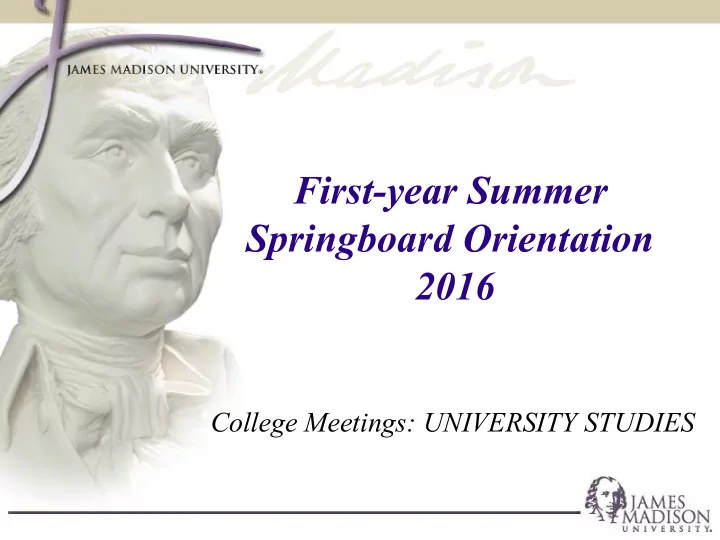

First-year Summer Springboard Orientation 2016 College Meetings: UNIVERSITY STUDIES
University Studies Why do you need a Dean’s Office? Role of the Office • • Dean’s List • Transferring Credits • Answering Questions Dr. Herb Amato amatohk@jmu.edu
Undeclared Students About 15% of all incoming 1 st year students Declare a major anytime between NOW and ….the third Friday of your Sophomore year
Graduation Requirements Credits General Education Program: 41 Major/Pre-professional program: 33-84 Elective or Minor Degree Requirements
Academic Expectations Strong commitment to a foundational liberal arts • education - 41 Credits (General Education Program) Equal commitment to applying learning in the real • world — across all majors Strength of interdisciplinary curriculum •
JMU Majors 33-84 credit hours: Great amount of variation between majors and in the number of credits required • Second Major • Minor (s) • Electives
Major Snapshots JMU Major Important Links • Description of Major • Homepage • Degree(s) Offered • Catalog Requirements • Concentrations • Careers • Minors • Declaring Major • Progressing in the Major http://www.jmu.edu/advising/majors/major-snapshots.shtml
JMU Majors … Accounting Earth Science Anthropology Economics Art History Engineering Athletic Training English Biology Finance Biophysical Chemistry Geographic Science Biotechnology Geology Chemistry Graphic Design Communication Sciences and Health Sciences Disorders Health Services Administration Communication Studies History Computer Information Systems Hospitality Management Computer Science Integrated Science and Technology Dietetics Intelligence Analysis
JMU Majors Religion Physics Interdisciplinary Liberal Studies Political Science Interior Architecture Psychology International Affairs Public Policy and Administration International Business Quantitative Finance Justice Studies Social Work Kinesiology Sociology Management Sport and Recreation Management Marketing Statistics Mathematics Studio Art Media Arts and Design Theatre and Dance Modern Foreign Languages Undeclared Music Writing, Rhetoric and Technical Nursing Communication Philosophy
Minors and concentrations Majors often have multiple tracks or concentrations leading to distinct career paths JMU has nearly 90 different minors — these are a great way to broaden knowledge or add professional expertise
Admission into a MAJOR • Open Major Good academic standing • Talent based programs Audition / Portfolio • Progression Standards Prerequisite Courses GPA requirements • Absolute Size Limits Not guaranteed admission
Restrictive Majors Talent Based Programs Open Anthropology Art, Graphic Design Biology Art, Inter. Architecture English Art, Studio Health Sciences Music Geology Theatre and Dance Religion Sociology
Restrictive Majors Progression Standard Absolute Number Accounting (COB) Nursing Dietetics Athletic Training Kinesiology Biology Media Arts and Design Psychology Intelligence Analysis Social Work
Pre-Professional Programs Education Health Fields Law Not a major or minor College of Education Medicine Early, Elementary, Reading Recommended Dentistry Exceptional courses and skills Middle, Secondary, Mathematics Optometry College of Health and Pharmacy Theology Behavioral Studies Physical Therapy Physical Educ. / Health Veterinary Medicine College of Visual and Occupational Therapy Performing Arts Physician Assistant Art, Dance, Music, Theatre Forensic Studies
Academic Expectations • Many majors have specific • Accept responsibility for your performance expectations , for own learning and rise to example, GPA requirements for academic challenges core courses ( Start Strong …) • Demonstrate intellectual • You are very well-prepared- curiosity • Ask questions • Come to class prepared • Attend office hours (We expect you to be successful • Get to know your professors here at JMU!) • Seek help (Learning Resource Centers)
Undeclared = Intentionally Exploring
Advising for Undeclared Students • Assigned to a full-time, professional career and academic advisor • You will stay with your advisor for most of your first year • Emphasis on helping you make good decisions • The decision on what major to pursue is yours • Access to full range of resources and tools
Talk to your advisor
Make exploring options a priority this year • UNST 102 – Career and Academic Planning Course 1-credit elective | Block or semester long course
Make exploring a priority this year
Career Guide to JMU Majors _________ http://www.jmu.edu/cap/careerguide
Decision Making Programs
English Literature Education Life Psychology Communication Business Environmental Studies
Career Readiness Competencies* *National Association of Colleges and Employers, 2016 • Critical Thinking/Problem Solving • Oral/Written Communications • Teamwork/Collaboration • Information Technology Application • Leadership • Professionalism/Work Ethic • Career Management
QUESTIONS? Dr. Herb Amato | amatohk@jmu.edu Associate Vice Provost for University Programs Mary Morsch | morschmd@jmu.edu Director, Career & Academic Planning
Recommend
More recommend